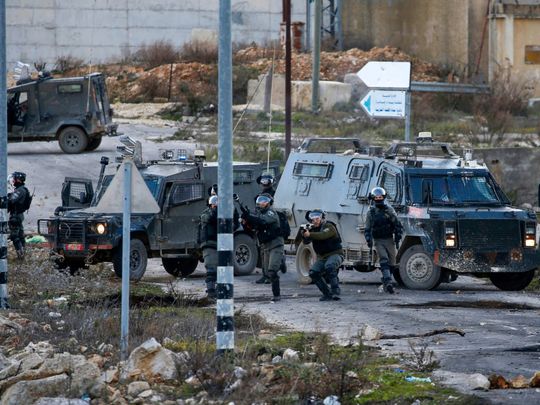
Although the Palestinian-Israeli conflict is taking place in a relatively small geographic area, it receives wide political and media attention due to the number of international parties involved in it. The great powers are involved due to the sensitivity of the location of the Arab world and the Middle East and its vast natural resources. Thus it has become the central issue in the region with Arab and Islamic dimensions.
When a military occupies an independent region, it will be called an occupied land. But what historical Palestine has faced exceeds the usual direct military occupation which often does not demand permanent sovereignty over the occupied land, with the controlling power not granting the occupied land citizens its nationality.
This kind of occupation was carried out by empires and countries to plunder resources and make a base to maintain the security of the ‘centre’ from where the foreign armies came. This usually takes place with the subjugation of the occupied peoples and lands and their resources for exploitation.
The occupation in Palestine is more than that as it suffers from additional types of occupations. These types are summarised in the following patterns:
‘Balfour Declaration’
First: The aforementioned direct military occupation where in 1917 British forces occupied Palestine and imposed a colonial rule to the delight of many in Europe because [occupied] Jerusalem fell under the Christian Western dominance for the first time since October 1187. Upon the beginning of its occupation, Britain announced that one of its goals was to fulfil the ‘Balfour Declaration’. This meant opening the door for the Jewish immigration to Palestine, establishing “a national homeland” for them and even encouraging and supporting them to ensure control of the eastern bank of the Suez Canal and the Arabs to be torn by establishing an alien entity that could also ensure getting rid of outcast Jews in Europe in general.
‘A land without people’
Second: The Zionist colonial occupation is a continuation of its predecessor and is the most dangerous because its goal is to establish roots in the land, exploit its inhabitants and uproot them from their lands by extermination or displacement.
This kind of colonialism aims to turn Palestine into ‘a land without people’, a land purely owned by the occupier and without its people. This occupation expanded in the West Bank since 1967 with the Jewish colonists having the opportunity, supported by Israeli governments, to take implementation of their plans into their own hands after creating for themselves a ‘popular’ organisational structure penetrating all sectors of the Zionist state, whether the legislative, governmental or judicial and even within the security/military establishment. Their danger exacerbated with the rising religious and/or extreme nationalist discourse that deepened, justifying a religious ethnic cleansing, taking advantage of the presence of their representatives in the government and in an increasing number in the army. They also received official support from the government and Israeli Knesset (parliament).
Control of natural resources
Third: Occupation of the economy, directly or indirectly which aims to ensure the occupier’s control of natural resources. According to the 2019 report of UNCTAD- the United Nations Conference on Trade and Development:
“This occupation deprived the Palestinians of the exploitation of oil and gas resources in the Gaza Strip and the West Bank. It also deprived the Palestinians of billions of dollars, and development opportunities ... these losses will increase and the economic costs of the occupation of the Palestinian economy will continue to rise.”
Cultural occupation
Fourth: The cultural occupation that aims to plunder and wipe the history of Palestine, and even the memory of the proud Palestinian, with his Arab history, language and culture. The Zionist state is well aware that if this living memory is not erased, it will never be able to reach its goal by cancelling the Arab-Islamic identity of the Palestinian people. Hence the seriousness of the last year Israeli “law of nationalism”, which transforms the situation from a racist status in real life on the ground to a state of consecration and legitimacy of a racist reality, thereby bringing the Palestinian inside his land to become a refugee in an attempt to undermine his political and cultural presence as an old/new reality on historical Palestinian land.
Historic Palestine was a testament to the vibrant Palestinian human and cultural existence and this is what contradicts the Zionist idea: “a land without a people, for a people without a land.” Therefore, the Israeli military occupation and colonising practise the policy of ethnic cleansing, as it continues today through a non-traditional long-term process carried out whose essence is colonial expansion on the ground even if this expansion leads to extermination. The Zionist goal is to fully occupy the homeland of the Palestinian people, to be replaced by Jews of the Zionist movement in its various shades.
— Professor As’ad Abdul Rahman is the chairman of the Palestinian Encyclopaedia.










